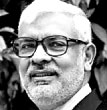
When we are asked to take a decision without the necessary information, what do we do? This is where psychological scientist Ramadhar Singh comes in. He has demonstrated how people take decisions by inferring the missing information.
Prof Singh, a distinguished professor at the Indian Institute of Management, Bangalore, is the only Indian to be on the list of the United States-based Association for Psychological Science (APS) and The Faces and Minds of Psychological Science, a list of leading researchers in psychology.
“This is my most important work of all the areas of research I have forayed into,” Prof Singh told Express.
“We often take decisions even when there’s not enough information. The processes and rules people followed to make such decisions can be determined by the missing information. Instead of determining the information given from what was missing, I went reverse by identifying the missing information from what was given.”
Prof Singh wrote on ‘Inferring Missing Information’ in the ‘I’m a Psychological Scientist’ series contest.
“Take donation, for example. If a person is very generous, it is inferred that he has a lot of money. But the inference won’t work vice-versa. Income and ability are considered as capability, while generosity and motivation are temporary energizing factors. Our people believe they can change ability by being nicer. What I have done is a meta-cognitive analysis,” he explained.
According to the APS, “Prof Singh’s work identifying asymmetrical inferences has helped social and cross-cultural psychologists understand and investigate how people judge morality and achievement of others even without the needed information.”
Prof Singh said he is proud that psychological research from India has been recognised. “To be a part of some of the biggest names in psychology has made me very happy,” he said. After his PhD from Purdue University in 1973, Prof Singh returned to India.”Then, people said nothing could be done here. But I always believed India has more potential than anywhere.”
He worked on “Inferring missing information,” from 1975 to 1991, when it was published first as a chapter. His biggest challenge, he said, “was to sit on one problem for more than 15 years.” When asked for his assessment of psychology education in the country, Prof Singh lamented by saying it needs a revamp.
“We have to ensure we don’t recognise a person unless they deserve recognition. The PhD Selection Committees need improvement in the quality of selection of PhD scholars,” he said.
“Psychology is a great science that needs to be enjoyed,” is his dictum to young students. He said the recognition he has achieved is because of the IIM-B’s decision to have him onboard in July 2010.
Know Ramadhar Singh
After his BA and MA from Bihar University, Prof Singh went to Purdue University in 1972 for an MS in Social Psychology, in which he also received his PhD. He has taught at Indian Institute of Technology, Kanpur, IIM Ahmedabad and National University of Singapore. “I got some of my ideas from the bright students I taught. I was brought to IIM-B to bring it global recognition. I am happy I have been able to do that,” he said.